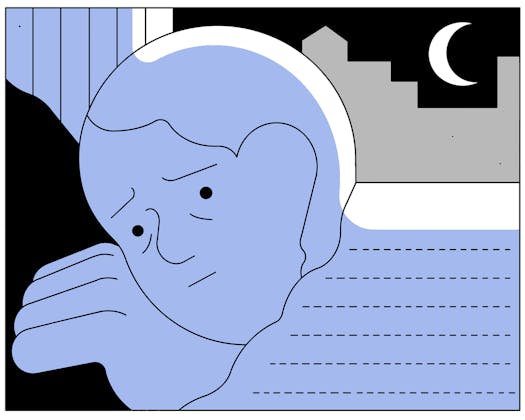It's 3 a.m., and you've been struggling for hours to fall asleep. As morning draws nearer, your anxiety about being exhausted the next day intensifies — yet again.
If this sounds familiar, you're not alone. Among the many disruptions of 2020, insomnia ranks high on the list. Exact data on how the pandemic has affected sleep are limited because biomedical research can take years to shake out, but evidence suggests that prolonged confinement is altering sleep in adults as well as children.
If it's happening to you, here are some steps to consider:
Don't be afraid to get help. Stressful and upsetting experiences like the death of a loved one or the loss of a job — two widespread realities of COVID-19 — are known psychological triggers for insomnia. If your insomnia is tied to such an event, the quickest way to get help is to call your doctor.

Nadia Hafid • New York Times
One thing many doctors suggest is cognitive behavioural therapy, or CBT, sometimes referred to as CBT-I for insomnia. It includes a variety of techniques, among them meditation, mindfulness and muscle relaxation. Jennifer Martin, a psychologist and professor of medicine at the University of California, Los Angeles, also recommends an app called Insomnia Coach, which is free and offers evidence-based, self-guided help through tools like a sleep diary and trackers for sleep habits and hygiene.
Get out of bed. The goal here is to separate your sleep space and habits as much as possible from your waking space and habits. It may be comfortable and cosy to stay in your pyjamas while working or attending school remotely, but CBT experts advise getting dressed every morning. And don't stay in your bed all day.
Reset bedtime. Parents of young children might notice a "forbidden zone" phenomenon when it comes to bedtime, said Dr. Craig Canapari, a paediatric sleep physician and director of the Yale Paediatric Sleep Centre. The trigger here may be a later bedtime for your children that's crept in this year. If this sounds familiar, try reverting back to their — and your — pre-pandemic schedule.
But a bedtime that's not late enough also can cause insomnia. It might seem counterintuitive, especially if you didn't sleep well the night before, but getting in bed before you're ready to fall asleep can set off the vicious cycle of wanting to fall asleep and then worrying that you're not falling asleep. So instead of rushing under the covers, try taking a warm shower, listening to music for a while or stretching your neck and shoulders.
Kill the screens. Screens — including the television — are bad for sleep because they emit blue light, which can suppress the body's natural secretion of melatonin, a hormone that regulates the sleep-wake cycle. Canapari stresses putting away all screens in the evening: "I really cannot emphasize enough how important it is that children do not have access to devices in their room."
Screens usually come hand-in-hand with being sedentary, Canapari said, and exercise promotes healthy sleep. He suggests parents help their children get at least 60 minutes of vigorous physical activity every day, though not right before bedtime.
Lay off the booze. Alcohol suppresses the central nervous system. It causes brain activity to slow down and produces a sleepy, sedative feeling. This can seem very relaxing for someone struggling with sleep, but as alcohol is metabolized through the night, it robs the body of crucial REM sleep and can trigger a "rebound effect," waking you up in the wee hours after its sedative effects have worn off.
If alcohol is affecting your sleep, it might be causing you to consume another insomnia culprit the next day, like caffeine. Martin suggested avoiding caffeine for five hours before bedtime.
In some insomnia cases, prescription drugs and supplements — particularly melatonin for children — may be helpful. But the ultimate goal, Canapari said, "is to address the issue so you don't need to use the medication long term."
https://www.startribune.com/don-t-let-covid-19-steal-your-sleep/573367831/
No comments:
Post a Comment